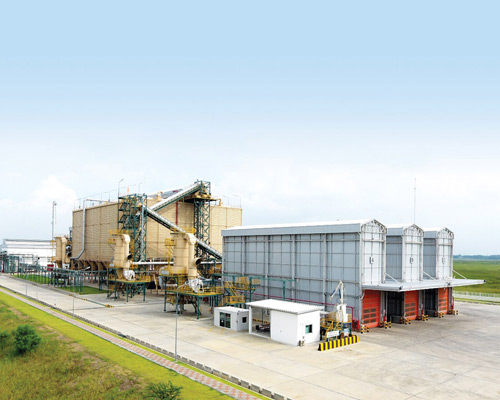
11-13 Feb, 2020 - Bangkok, THAILAND
Hilton Sukhumvit Bangkok

Hilton Sukhumvit Bangkok
"Meeting increasing demand for tapioca starch as CMD threatens future supply"
"Recent breakthroughs in Novel Waxy Tapioca Starch"
"Modified Corn Starch Development & Prospects in China"
According to MarketsandMarkets reports ,the modified starch market is projected to reach a value of USD 12.67 Billion by 2023 - driven by the rise in demand for functional food & beverage products, convenience food products and the increasing need for its usage as a renewable raw material in the production of packaging materials and biodegradable plastics.
In Thailand many native starch factories are already producing modified starch so much so that it has turned into a commodity product with intense price competition.
Meanwhile, the region continues to grapple with the severity of CMD (cassava mosaic disease).
While coping with the increasing demand for tapioca roots, farmers continue to bring tapioca trees from outside their own territory compounding the situation.
As more starch factories increase their capacity, how can the region cope with the threat of CMD ?
Most new starch factories capacity are very big require tapioca root of more than 2,400-3,000 m/t per day.
Thailand produces about 28-30 million ton of tapioca root per year and consumes more than 80-85 %.
Where will new sources of tapioca starch come from if supply from Asia is affected by CMD ?
What is the extent of the CMD damage and has it been brought under control ? What is going on regarding deployment of resistant materials ?
Developments in Waxy tapioca starch continues .SMS , the first company to commercialize waxy tapioca starch products will share recent breakthroughs and trends on clean food solution
High fiber diets have been promoted over the past several years because of the potential health benefits they offer. Capturing on the growing fibre trends, how can the tapioca industry derive further value from the pulp fibre, which is a by-product of the starch milling process?
Waste generation is a key environmental issue in the cassava processing industry. In the quest for a circular economy, Thailand’s cassava industry today can be considered an industry trendsetter. In a very short period of time, 90% of the industry has adopted anaerobic pretreatment, representing a major reduction in greenhouse gas emissions.
One such company that is showing a good example of a sustainable concept is FD Green which is part of the Ajinomoto Group
The group produces amino acids from sugars/ starches through fermentation process and a large amount of organic by-products are also produced. The company that has strong commitments to protect the environment established a Bio-Cycle concept to make use of these organic byproducts for sustainable amino acid production. These by-products are returned to farms mainly as fertilizer
Attend CMT’s 9th Annual Starch World ASIA in Bangkok and also opt for the tour to visit the Ajinomoto Amino-Acid factory in Ayutthaya as well as have a glimpse on the surrounding cassava plantations.
Key Highlights:
TESTIMONIALS FROM 8th STARCH WORLD ASIA
"Many information shared"
- Tereos
"Good mixture of different topics (research, producers, economics)"
- Flottweg
"Good variety of subjects across CMD, total supply demand carbohydrates, novel waxy starches and applications"
- Tate & Lyle
"Updated news in market, raw materials supply, technology, regulation, and meeting peers and making connections"
- Thai Wah
12th February 2020 (14:00 – 17:30)
| Purpose |
If you are an ingredient or food or feed producer or manufacturer, or you are expanding into these areas, this workshop helps you in broadening your knowledge and obtaining new insights. An emerging and expanding field in the food and feed sector is the application of dietary fibres. The use of starch and starch production by-products from for instance cassava for novel healthy ingredients is growing and offering new opportunities.
The Workshop is an introductory workshop combining base know-how with practical knowledge and implications for food and feed companies. Emphasis will be on product development, emerging novel products and quality control in a various food and feed categories. The workshop consist of 2 main topics: Starch, & Dietary Fibres.
| Benifits of Attending |
This professional educational opportunity allows attendees to:
| Target market |
| Intended Audience |
This workshop is designed for
| Session Topics |
Starch :
Dietary fibers :
| WorkShop Leader |

Dr. Jeroen van Soest
Business Innovation Manager Eurofins Food, Feed and Water testing The Netherlands – Expertise Centre for Complex Carbohydrates and Chemistry (CCC).
Summary
Experience in new product- and market development from ideation tocommercialization.Experience in carbohydrate quality testing (QA: ISO 17025) Specialties: working with customers, communication, innovation,product development, project managementTechnical background : Carbohydrates, Polysaccharides (Starch,Gums), Proteins, Biopolymers - Food, Feed and Non-Food products,Analytical chemistry, Quality Control.
Separately Bookable POST-CONFERENCE SITE VISIT

13th February 2020, Post-conference Site Visit to
The factory is located in Nakhon Luang District, Phra Nakhon Si Ayutthaya Province. It is the third MSG Factory of the company to produce AJI-NO-MOTO® product to support the market growth both domestic and overseas. The factory started its operation in April, 2013. This factory utilizes advanced production technologies from Japan which enables the use of agricultural materials both tapioca starch and cane molasses for AJI-NO-MOTO® production. Besides, for sustainable living with the community, the factory implements “Biomass Boiler Technology” which uses rice husk and bagasse to produce stream energy replacing the petroleum usage. It is the 2nd factory of the company next to Kamphaeng Phet Factory that successfully developed this technology. In addition, the factory also set up the exhibition room to provide all-round information of umami and MSG to the public as well.
| Industry News |
|
President inaugurates large-scale cassava project with USD 40 million direct investment Tapioca imports to Japan surge, thanks to bubble tea popularity |
| Be a Sponsor or Exhibitor! |
|
This event is an excellent platform to promote your organization to influential players and investors in the industry. Sponsorship opportunities available include Corporate, Exclusive luncheon & Cocktail sponsor. |
15 Jan, 2020
05 Dec, 2019
25 Nov, 2019